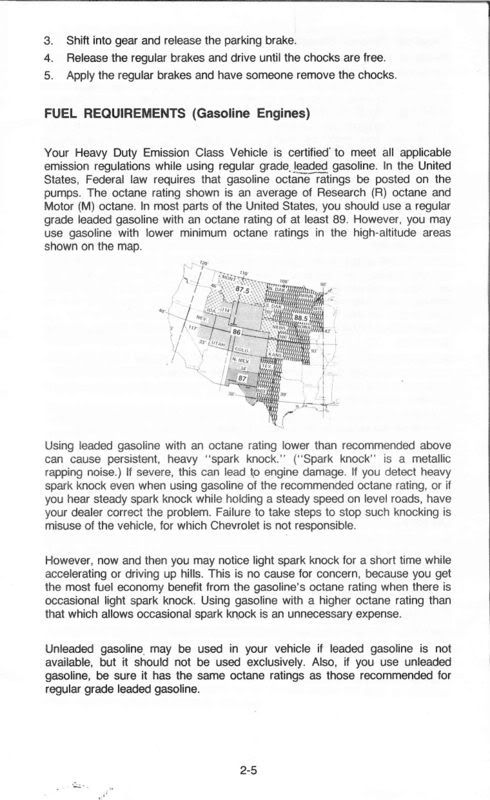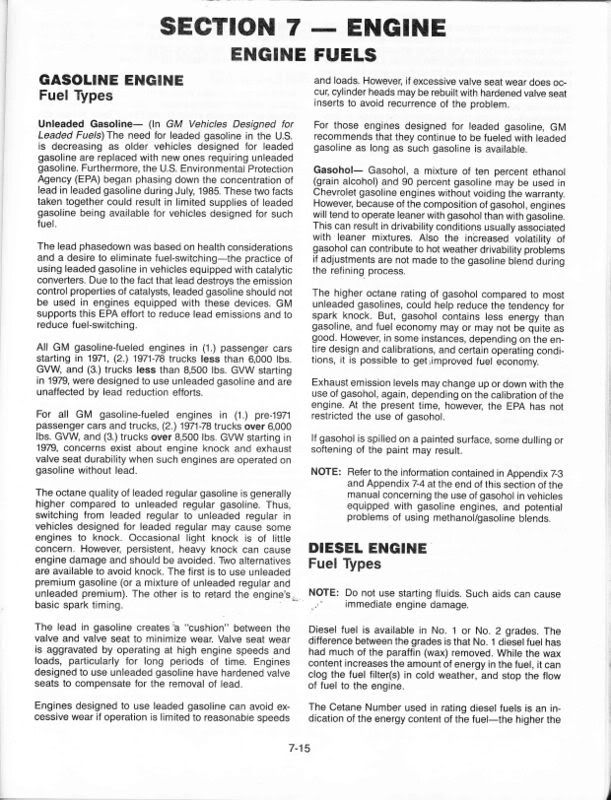Go to...  | Start A New Topic  | Search  | Notify  | Tools  | Reply To This Topic  |  |
I was reading the Chevy manual that came with my Barth and it stated that you should use leaded gas with an octane of at least 88.5 (or 86 out here in Colorado). It also stated that you CAN use unleaded gas, but not for an extended period. Do you use or would you recommend regular use of some sort of a lead additive? I'm not even sure if lead additives are still available. Recommendations? 1984 Barth Regal 28' 1941 Indian Four 1931 Indian 101 Scout 1941 Indian Chief w/Sidecar | |||
|
| First Month Member |
Ken, what year is your Barth? What year is the manual? GM started induction-hardening exhaust valve seats 71 or so for use of unleaded fuel. . 84 30T PeeThirty-Something, 502 powered | |||
|
My Barth Regal is titled as an '84 that came with an 1983 Chevy Chassis Manual. The manual says you CAN use unleaded gas, just not exclusively. I assume as long as I'm not driving 75 MPH for thousands of miles, I should be OK, correct? 1984 Barth Regal 28' 1941 Indian Four 1931 Indian 101 Scout 1941 Indian Chief w/Sidecar | ||||
|
Captain Doom |
The issue was when stellite valve seats were installed. When I was a rep for Shell Oil in the late 60s/early 70's, Shell introduced its "Shell of the Future" unleaded gaso (different from Amoco, in that it was regular octane rating, not premium like Amoco). SoF did have TCP (Tricresyl phosphate, a decent valve lube in its own right). The issue is that engines in that vibtage (as today) had automatic valve rotators, and with non-stellite seats, the valves would burrow into the seats, necessitating replacement. But I'm with bill h - I think by '76, all GM engines were capable of running forever on unleaded...the switchover to stellite was nearly complete by '72, IIRC. There are, however, additives to add TEL (tetraethyl lead) to fuel - the downside is that lacking TSP, the lead will foul plugs. Frankly, I'd try contacting GM as get a real answer, as I suspect the manual is wrong. Rusty '94 28' Breakaway: MilSpec AMG 6.5L TD 230HP Nelson and Chester, not-spoiled Golden Retrievers Sometimes I think we're alone in the universe, and sometimes I think we're not. In either case the idea is quite staggering. - Arthur C. Clarke It was a woman who drove me to drink, and I've been searching thirty years to find her and thank her - W. C. Fields | |||
|
| First Month Member |
Even if you could get leaded gas, would the nozzle fit in your filler? Is it marked "unleaded only"? All of the GM iron heads I have played with down had induction-hardened exhaust valve seats, not stellite. The induction hardened seats are around 62 Rockwell C, like a good knife. Stellite is much harder. . 84 30T PeeThirty-Something, 502 powered | |||
|
Captain Doom |
Don't listen to me - in the early 70s, the music from GM said they were going to stellite - but I was down the road before any final declarations were made... Rusty '94 28' Breakaway: MilSpec AMG 6.5L TD 230HP Nelson and Chester, not-spoiled Golden Retrievers Sometimes I think we're alone in the universe, and sometimes I think we're not. In either case the idea is quite staggering. - Arthur C. Clarke It was a woman who drove me to drink, and I've been searching thirty years to find her and thank her - W. C. Fields | |||
|
Thanks for the info. Actually, I did contact GM about my question and after 2 hours of callbacks by a customer service technician with a distinctly middle eastern accent, she read verbatim to me from the manual I already had as to the fuel requirements. When I asked for further clarification she offered to provide me with a GM dealer near where I live. Ahhh, I love good corporate outsourced customer service!! Guess I'll just drive it as it is and hope for the best. New valves and seats may be in my future. I'll keep you posted. 1984 Barth Regal 28' 1941 Indian Four 1931 Indian 101 Scout 1941 Indian Chief w/Sidecar | ||||
|
Captain Doom |
I think that'll work out fine - frankly, I suspect your engine has stellite seats. What may be causing this issue is that passenger cars had to go to unleaded fuel (hence the smaller filler necks [1-1/2"] for unleaded) before trucks did. But IIRC, there were very few locations selling leaded gaso after '82. Rusty '94 28' Breakaway: MilSpec AMG 6.5L TD 230HP Nelson and Chester, not-spoiled Golden Retrievers Sometimes I think we're alone in the universe, and sometimes I think we're not. In either case the idea is quite staggering. - Arthur C. Clarke It was a woman who drove me to drink, and I've been searching thirty years to find her and thank her - W. C. Fields | |||
|
| First Month Member |
I haven’t gone through my whole Big Block shelf, but Dave Emmanuel, in his book, Big Block Chevy Performance, (pg 57) writes “All factory-installed big block heads manufactured after 1971 have induction-hardened exhaust valve seats……..Marine engines, which operate under heavy load most of the time, are the exceptions”. Chevron, http://www.chevron.com/products/prodserv/fuels/bulletin/unld-gas/ says, “typical passenger car and light-duty truck engines are safe from valve recession when operated on unleaded gasoline. They are either equipped with induction hardened valve seats or subjected to service too mild to cause problems. There is concern about older four-stroke cycle engines in marine service, which were designed prior to the introduction of unleaded gasoline (pre-1974). Under severe duty, these older engines could have valve recession problems. If these engines are in severe duty service, owners should consider installing hard seat inserts or using lead substitute additives to minimize valve recession. Products like this have been found effective in minimizing valve recession.” -------------------------------------------- One issue here seems to be what exactly is a heavy load. Certainly going up Sherwin Grade with a toad on a hot day is a heavy load. Or from Tom’s Place to Rock Creek Lake. Motor homes do not have BMEP indicators, but a little information on vacuum and RPM would clarify things. Another issue seems to be whether or not an 84 P30 had induction-hardened exhaust valve seats.. Dave Emmanual says that they all did since 1971. I have read and used his books and articles for years, and have never found him to be wrong. Chevron’s mention of “pre 1974” engines being an issue is not as clear-cut, but still fits in with my belief system and experience. A side issue is the exhaust valve rotation cycle, in degrees. Too much rotation actually makes valve seat recession worse, not better However, Chevrolet’s own publications could be used to make the case that the 84 P30 engine was designed for leaded fuel. One could make a Kierkegaardian leap of faith (or at least engage in a little Clintonian parsing) and conclude that Chevy did not harden the valve seats on “trucks over 8500 lbs GVW starting in 1979”. They also state, “Engines designed to use unleaded gasoline have hardened valve seats.” They also say, “Valve seat wear is aggravated by operating at high engine speeds and loads, particularly for long periods of time.” Of course, ignoring the Socratic dictum, they do not define their terms. You’ve really got to read the whole thing, and I have posted it here. I have trouble believing that they did not harden above-8500 GVW valve seats when the writing was on the wall about leaded fuel going away since the late sixties. The only thing I can think of is that hardening a valve seat makes the area brittle, and more cracks do indeed result. Perhaps they thought that a truck or motor home engine worked the engine harder and more cracks would result if the seats were hardened. This is only supposition on my part, though. I would assume that the lady in Bangalore is unable to provide any positive information. Maybe Jake has some inside contacts. If I had an engine of that vintage in my coach, I would use an additive and do regular compression checks, and listen at each exhaust pipe often. Unless the heads are valuable, replacing them with heads with hardened seats would be more economical than having new seats put in. I had Martite seats installed in some pre-unleaded heads that had expensive port work, but it was not cheap. Any experienced head man can tell with a file if the seats are hardened. Or he can judge by how his cutter sounds. Sometimes, a different coloration can be seen around the seat after a cleanup.   . 84 30T PeeThirty-Something, 502 powered | |||
|
Thanks Bill for the additional historic insights. Any recommedations on what additive, brand and amount, to use IF I choose to go the leaded route? 1984 Barth Regal 28' 1941 Indian Four 1931 Indian 101 Scout 1941 Indian Chief w/Sidecar | ||||
|
| First Month Member |
It has been a while, but the last one I used was Red Line. I did no tests or evaluation of my own, but relied on advice from several trusted friends, including one who races an old Morgan. I will ask him if he has any current information from the Morgan club. I used it in a boat engine, and a later teardown showed no seat recession. Pulling a barefoot skiier really works an engine, so I think it was a fair test. . 84 30T PeeThirty-Something, 502 powered | |||
|
Great. I'll see what I can find and keep you posted. 1984 Barth Regal 28' 1941 Indian Four 1931 Indian 101 Scout 1941 Indian Chief w/Sidecar | ||||
|
| Powered by Social Strata |
| Please Wait. Your request is being processed... |
|
This website is dedicated to the Barth Custom Coach, their owners and those who admire this American made, quality crafted, motor coach.
We are committed to the history, preservation and restoration of the Barth Custom Coach.
We are committed to the history, preservation and restoration of the Barth Custom Coach.

